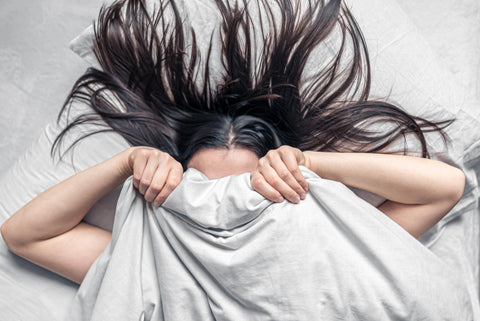Lack of sleep, also known as sleep deprivation, can have a wide range of negative effects on both our physical and mental well-being. Here are some of the common effects of not getting enough sleep:
- Cognitive Impairment: Sleep deprivation can lead to difficulties with concentration, memory, problem-solving and decision-making. Your cognitive functions may become impaired, making it harder to focus and perform tasks efficiently.
- Mood Changes: It plays a significant role in regulating mood. Lack of sleep can lead to irritability, mood swings, increased stress, anxiety and even depression. It can make you more emotionally reactive and less able to cope with daily stress.
- Physical Health: Chronic sleep deprivation has been linked to a variety of health issues, including obesity, diabetes, heart disease and a weakened immune system. It can also contribute to increased inflammation in the body, which is associated with other various health problems.
- Impaired Motor Skills: It can negatively impact your coordination and reaction times, increasing the risk of accidents and injuries, especially while driving or operating heavy machinery.
- Weakened Immune System: A good night’s rest is essential for proper immune function. Lack of can weaken your body's defences against infections, making you more likely to fall ill.
- Weight Gain: It can disrupt hormonal regulation, leading to an increase in appetite and cravings for high-calorie, unhealthy foods. This can play a part in weight gain and obesity.
- Cardiovascular Issues: Chronic sleep deprivation is associated with an increased risk of high blood pressure, heart attack, stroke and other cardiovascular health problems.
- Decreased Libido: It can lead to a decrease in sexual desire and overall sexual functioning.
- Skin Problems: Lack of sleep can contribute to skin issues such as acne, dull complexion and premature ageing. During deep sleep, the body repairs and regenerates skin cells.
- Hormonal Imbalance: It is crucial for maintaining proper hormonal balance in the body. Disruption in sleep patterns can lead to irregularities in hormone production, affecting various bodily functions.
- Impaired Long-Term Health: Consistently not getting enough sleep over time has been linked to a shorter lifespan and an increased risk of chronic diseases.
It's important to note that the effects of sleep deprivation can vary from person to person and depend on factors such as age, overall health and individual needs. To maintain optimal health and well-being, it's recommended to prioritise getting enough high-quality sleep on a regular basis.
How Much Sleep Do I need?
It is recommended to get at least seven to nine hours per night. If you're experiencing persistent sleep problems or deprivation, consider seeking guidance from a healthcare professional.

Causes of Lack of Sleep
Lack of can result from a variety of factors, both external and internal. Here are some common causes of deprivation:
- Poor Sleeping Habits (Sleep Hygiene): Engaging in behaviours that disrupt your natural sleep-wake cycle can lead to deprivation. This includes irregular slumber schedules, excessive napping during the day and using electronic devices before bedtime.
- Stress and Anxiety: High levels of stress, worry and anxiety can make it difficult to relax and fall asleep. Racing thoughts and a preoccupied mind can prevent you from getting adequate rest.
- Work Schedule and Shift Work: Jobs that require irregular or overnight shifts can disrupt the body's natural circadian rhythm, making it challenging to establish a consistent routine.
- Electronic Devices: The blue light emitted by smartphones, tablets, computers and TVs can interfere with the production of melatonin, a hormone that regulates sleep. Using these devices close to bedtime can make it harder to fall asleep.
- Caffeine and Stimulants: Consuming caffeine, nicotine, or other stimulants close to bedtime can disrupt sleep by making it harder to fall asleep and reducing quality.
- Medical Conditions: Certain medical conditions, such as chronic pain, asthma, allergies, gastroesophageal reflux disease (GERD) and disorders like insomnia or sleep apnoea, can lead to an inadequate night's rest.
- Medications: Some medications, including certain antidepressants, stimulants and decongestants, can interfere with sleep and contribute to sleep deprivation.
- Environmental Factors: Noise, light, temperature, and uncomfortable bedding can all affect your ability to fall and stay asleep.
- Lifestyle Factors: Alcohol consumption, particularly close to bedtime, can disrupt the sleep cycle and lead to fragmented sleep.
- Travel and Time Zone Changes: Rapid travel across multiple time zones (jet lag) can disrupt your body's internal clock, leading to difficulty falling and staying asleep in the new time zone.
- Life Transitions: Major life changes, such as childbirth, caring for a newborn, or adjusting to a new job or living situation, can disrupt sleep patterns.
- Age: Sleep patterns and needs change over the course of a lifetime. Adolescents and young adults may experience shifts in their sleep-wake cycle due to hormonal changes, while older adults might have more fragmented sleep due to factors like medical conditions or medication use.
- Substance Abuse: Drug or alcohol use can disrupt sleep patterns and lead to deprivation.

Supplements To Improve Your Sleep
Several supplements are believed to promote a better night's rest by addressing various factors that affect sleep quality and duration.
However, it's important to note that while some people may find these supplements helpful, individual responses can vary. Before adding any supplements to your routine, it's a good idea to consult with a healthcare professional, especially if you have underlying health conditions or are taking other medications.
Here are some supplements that are commonly used:
- Melatonin: Melatonin is a hormone. It helps regulate the sleep-wake cycle. Taking melatonin supplements can be helpful for people with insomnia or those who experience jet lag or shift work sleep disorder. It's best to start with a low dose and take it about 30 minutes before bedtime.
- Magnesium: Magnesium is known to promote relaxation and reduce muscle tension. Some studies suggest that magnesium supplementation may help improve the quality of sleep, especially in individuals with magnesium deficiency.
- L-Theanine: L-Theanine is an amino acid. It is known for its calming effects and may help reduce stress and anxiety, leading to improved sleep quality.
- Valerian Root: Valerian root is an herbal supplement that has been traditionally used as a natural remedy for sleep disorders. Some people find it helpful for promoting relaxation and improving sleep.
- Glycine: Glycine is an amino acid that may have a positive impact on sleep quality. It may help improve efficiency and reduce the time it takes to fall asleep.
- Chamomile: Chamomile is an herbal remedy often consumed as a tea. It has calming properties and may help promote relaxation and better sleep.
- 5 Hydroxytryptophan (5-HTP): 5-HTP is a compound that the body converts into serotonin, a neurotransmitter that plays a role in mood and sleep regulation. Some studies suggest that 5-HTP supplementation may also improve quality.
- Passion Flower (Passiflora incarnata): Passionflower is a herbal remedy that has been used to treat anxiety and insomnia. It may help improve sleep quality by promoting relaxation.
- Vitamin B6: Vitamin B6 is involved in the production of melatonin, a hormone that regulates sleep. Ensuring adequate levels of vitamin B6 may support healthy sleep patterns.
- Zinc: Zinc is an essential mineral that may play a role in regulating rest. Some research suggests that zinc supplementation may improve sleep quality, especially in individuals with zinc deficiency.
Remember that supplements should be used as part of a holistic approach to improving sleep, which includes practising good sleep hygiene, maintaining a consistent schedule, creating a comfortable environment and managing stress. It's also important to choose reputable brands and follow recommended dosages to ensure safety and effectiveness.
Related Articles
- How to Improve Sleep Quality – HealthAid®
- Effects of Lack of Sleep on Our Mental Health – HealthAid®
Sources
- Good Night’s Sleep is Crucial to Your Health – Informed Opinion - NHRI (naturalhealthresearch.org)
- Insomnia - Symptoms and causes - Mayo Clinic
- Lack of sleep: Can it make you sick? - Mayo Clinic
- Here’s What Getting Less Than 7 Hours of Sleep a Night Can Do to You (healthline.com)
- Can You Die from Lack of Sleep? Here’s What We Know (healthline.com)
- 7 Natural Sleep Aids that Work to Improve Sleep & Health - Dr. Axe (draxe.com)
- L-Theanine Benefits, Uses, Side Effects, Dosage, Foods - Dr. Axe (draxe.com)
Images: Image by jcomp on Freepik Image by pvproductions on Freepik Image by karlyukav on Freepik
Any information or product suggested on this website is not intended to diagnose, treat, cure, or prevent any medical condition. Never disregard medical advice or delay in seeking it because of something you have read on this website. Consult your primary healthcare physician before using any supplements or making any changes to your regime.




